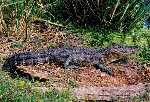

When they catch them in the wild, they use a noose and put it around their necks. Then they get a grasp of their weak jaw and bind some sticky tape to keep them shut. They are brought into the boat and are wrapped in canvass so they can be easily carried and are carried onto land. The farms are kind of alike. The farms are just like the farms we have, and instead of raising cows, sheep, horses, goats, chickens, ducks, and other animals, they raise alligators. When the baby alligators hatch, they are put into little buildings that look like very low silos, with water on the floor of the structure and windows for air. People can go in and feed the alligators but they don't eat much. There are a couple hundred alligators in one structure, but the structures are quite big. There are a couple structures on each farm and they are all filled with alligators.
But the alligators don't get to adult size, like the ones in the wild. They usually only reach to their adolescent age. They are taken from the building, and tape is wrapped around their jaws, since their muscles that help the alligator open its mouth are quite weak, not like the ones that are for closing its jaws, which can give a horrible bite. Then they are wrapped in canvass so they can be easily carried to the main building. Then they're slaughtered (how horrible!) and the skin is taken off the little alligator. Then the meat, the colour of a shark's meat, is sent to luxury restaurants where people consider it a delicacy. The skin is used for handbags, shoes, coats, and other accessories. The farming may sound horrible, but it actually helps the alligators in the wild, because the farms are easier then catching alligators in the wild and the business is booming with tons of customers that there is no need for alligator skin from the wild. But I think it's still horrid, catching wild animals, domesticating them and then slaughtering them. This doesn't mean that you can buy something made of alligator skin, or the skin of any wild animal. It's just that the word needs to get out so the world would be a better place.